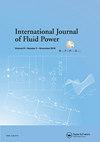Control of the Test Rig for Spring Stiffness Measurement with Hydraulic Integrated Actuator and Computer Vision
IF 0.9
Q4 ENGINEERING, MECHANICAL
引用次数: 0
Abstract
The paper deals with the control of the test rig for measurement of the stiffness of the spring. The test rig is equipped with integrated hydraulic actuator and multilayer control system with computer vision to automate the testing process and to increase the safety of the operating staff during the testing. The integrated hydraulic actuator allows to control the piston velocity and position and to produce the force needed for the spring compression and stiffness measurement. It has an integrated manifold with four proportional flow control valves connected as the full hydraulic resistance bridge. Each control valve is controlled separately using the input signal. That makes it possible to realize different connections and control strategies of the hydraulic cylinder using the different control algorithms. The hydraulic circuit was modelled and simulated, and the achieved simulation results are presented in the paper. The test rig is controlled using the microprocessor control system and is it equipped by different transducers – position transducer, pressure transducers and force transducer to be able to collect data important for the stiffness characteristic evaluation. The upper level of the control system is created by the vision control system. The goal of the implementation of the machine vision is to decrease the number of the manual operations done by the technician by the spring testing and to extend the automatic testing cycle of the automatic computer vision-controlled movement of the actuator at the beginning of the testing cycle and finally to increase the safety of the operating staff. The structure and functionality of the designed control system, experimentally obtained results and evaluated stiffness characteristic of the tested spring are presented in the following chapters.液压集成作动器与计算机视觉对弹簧刚度测量试验台的控制
本文讨论了弹簧刚度测量试验台的控制问题。该试验台配备了集成液压执行机构和多层计算机视觉控制系统,使试验过程自动化,增加了试验操作人员的安全性。集成的液压执行器可以控制活塞的速度和位置,并产生弹簧压缩和刚度测量所需的力。它有一个集成的歧管与四个比例流量控制阀连接作为全液压阻力桥。每个控制阀分别使用输入信号进行控制。这使得使用不同的控制算法实现液压缸的不同连接和控制策略成为可能。对液压回路进行了建模和仿真,并给出了仿真结果。该试验台采用微处理器控制系统进行控制,并配备了不同的传感器——位置传感器、压力传感器和力传感器,以便收集刚度特性评估的重要数据。控制系统的上层由视觉控制系统创建。机器视觉实施的目标是减少技术人员通过弹簧测试所做的手工操作的次数,延长测试周期开始时执行器的计算机视觉自动控制运动的自动测试周期,最终增加操作人员的安全性。在接下来的章节中介绍了所设计的控制系统的结构和功能、实验结果和测试弹簧的刚度特性。
本文章由计算机程序翻译,如有差异,请以英文原文为准。
求助全文
约1分钟内获得全文
求助全文

 求助内容:
求助内容: 应助结果提醒方式:
应助结果提醒方式:


